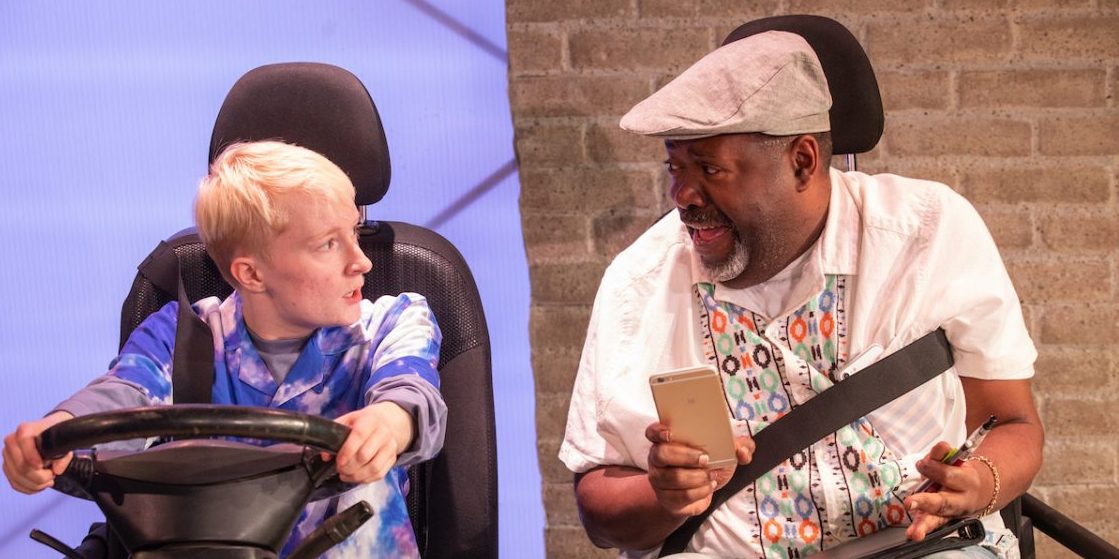The Studio at the Bush Theatre currently hosts an hour-long two-hander devoted to driving lessons. Or so it appears. Two car seats, a gear stick and a steering wheel sit centre-stage and apart from a bench to the side for scenes outside the car and a suggestion of a building as a backdrop, that is the set. Two characters introduce themselves, Max, a middle-aged black driving instructor, and Tyler, who is white and transgender. Max is full of swaggering authority and Tyler is shy and unconfident, forever missing the biting point on the clutch, and by inference, in life as a whole. As the play progresses these polarities begin to blur and ultimately reverse altogether.
Will Jackson’s text is witty, tender and plausible – a fine piece of writing that establishes character quickly and economically, setting up several fine scenes in which the talented actors gradually break down barriers and establish a rapport despite the apparent initial gap in understanding and empathy. There is tension and humour in equal measures, with confrontations caused both by tensions at the wheel and by the overflow of issues and themes from elsewhere in their lives.
Gradually it emerges that both characters are in flight from unresolved issues in their past, and each helps the other onwards – not to a resolution – that would be too pat – but rather to a new understanding of where they could take that self-knowledge next on their life’s journey. There is a fine sense of place as well, with both Birmingham and London swiftly and tellingly evoked, partly through descriptions of street scenes but also through the passage of events.
The acting is of a high order. As Tyler, Charlie Kafflyn is softly spoken and apparently introverted, but the quiet concentration of his delivery draws you into his world helped by the intimate, confiding performance space. Yet we get to see other aspects of who he is – whether partying or speaking intimately with his partner, all handled through faultlessly timed and toned telephone conversations. In contrast, Geoffrey Aymer, as Max, seems to fragment and deflate during the course of the action. Starting with bluster and confidence and a teacher’s natural authority, all of these qualities are gradually eroded so that he becomes haunted by his past and unable to live up to the version of himself he has projected to the world. This is most sensitively realised by Aymer, with the turning point being an accident which emerges out of a quarrel which synthesises all the issues between the two protagonists that the writer has so skilfully introduced.
There is a lot that we can identify with here, whether scenarios in driving lessons we have all experienced or broader situations in life in which wrong turns are made from which there appears to be no retreat, or decisions rushed from which there seem to be no escape. The cheerful moral, if moral there is, emerges that many situations are not quite as irretrievable as we might think at the time. Certainly, both characters are moving forward positively by the time we close, though without any artificially over-sweetened conclusion.
This is a charming, well fashioned, and excellently delivered production that deserves to find a fuller house than it did on the night I visited. Director Philip J Morris coordinates a fluent meld of creative contributions that never seems hurried or lets the pace drop. Overall, this is an excellent contribution to the Bush50 Studio season.

